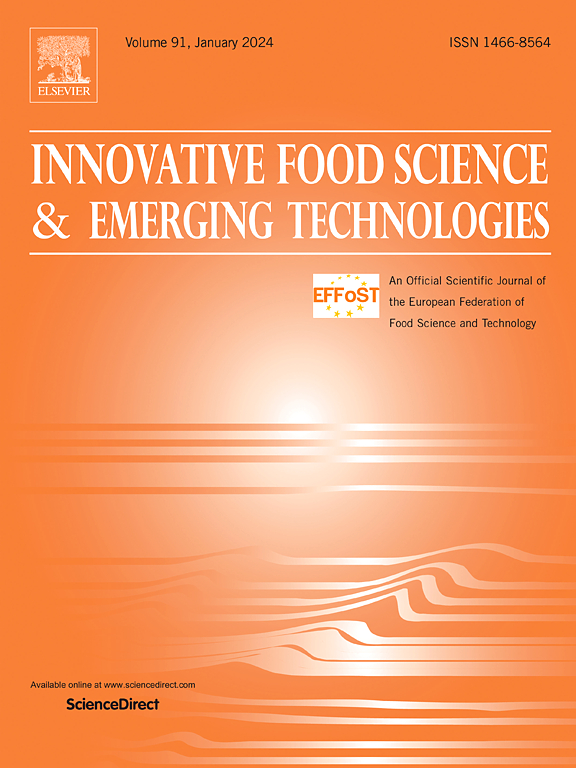开发低乳糖奶粉:减少马氏褐变的多酶方法
IF 6.3
1区 农林科学
Q1 FOOD SCIENCE & TECHNOLOGY
Innovative Food Science & Emerging Technologies
Pub Date : 2024-10-20
DOI:10.1016/j.ifset.2024.103849
引用次数: 0
摘要
由于乳糖不耐症的发病率越来越高,低乳糖牛奶和牛奶产品的制备引起了消费者的关注。然而,应用单一酶(β-半乳糖苷酶)制备的产品的理化性质存在严重的马氏褐变问题。以往的研究通过调整喷雾干燥条件来解决低乳糖粉的马氏褐变问题,而我们的研究则引入了一种多酶系统,用于水解浓缩脱脂奶中的乳糖,从而生产出可减少褐变的喷雾干燥粉。葡萄糖氧化酶(GOX)可将葡萄糖转化为葡萄糖酸,从而降低乳糖水解奶制品生产过程中形成的马氏反应产物(MRP)的浓度。当 GOX 与过氧化氢酶(CAT)同时使用时,其活性会得到增强。在缓冲溶液(含 9% 葡萄糖)中使用 GOX + CAT,经过 22 小时的反应后,葡萄糖含量降低了 61.44%。在β-半乳糖苷酶(9.53 U/ml)作用 5 小时后,将 GOX(70 U/ml)与 CAT(25 U/ml)一起加入牛奶中,20 小时后,牛奶的最终 pH 值为 6.5,葡萄糖的降低率(53.95 %)明显提高。使用优化的多酶(β-半乳糖苷酶和 GOX + CAT)处理过的牛奶制备的喷雾干燥粉与仅用β-半乳糖苷酶处理过的牛奶制备的粉末(16.37)相比,褐变特性有所降低,褐变指数为 12.85:工业相关性:在乳糖水解过程中使用 GOX + CAT 可作为减轻低乳糖牛奶和乳制品褐变特性的一种潜在方法。用于生产低乳糖牛奶的多酶系统很容易被大规模工业所采用,从而生产出物理化学性质类似于传统脱脂奶粉的奶粉。本文章由计算机程序翻译,如有差异,请以英文原文为准。
Developing low-lactose milk powder: A multi-enzyme approach to reduce Maillard browning
Preparation of low lactose milk and milk products have attracted the attention of consumers due to increasing prevalence of lactose intolerance. However, the physico-chemical properties of product prepared from the single enzyme application (β-galactosidase) possess a significant concern of Maillard browning. While previous studies adjusted spray drying conditions to address Maillard browning in low lactose powder, our research introduces a multi-enzyme system for lactose hydrolysis in concentrated skim milk to produce a spray-dried powder with reduced browning. Glucose oxidase (GOX) converts glucose into gluconic acid that lowers down the concentration of Maillard reaction products (MRP's) formed during manufacture of lactose hydrolysed milk products. The activity of GOX was enhanced when used along with catalase (CAT). Use of GOX + CAT in buffer solution (containing 9 % glucose) exhibited 61.44 % glucose reduction after 22 h of reaction. GOX (70 U/ml) along with CAT (25 U/ml) when added to milk after 5 h of β-galactosidase (9.53 U/ml) action resulted in significantly higher reduction of glucose (53.95 %) after 20 h with final milk pH of 6.5. Spray dried powder prepared using optimised multi-enzymes (β-galactosidase and GOX + CAT) treated milk revealed reduced browning characteristics i.e., 12.85 browning index as compared to the powder prepared from milk treated with β-galactosidase alone (16.37).
Industrial relevance: The use of GOX + CAT during lactose hydrolysis could serve as a potential approach for mitigating browning characteristics in low-lactose milk and milk products. The multi-enzymatic system used to produce low-lactose milk can be easily adapted by large-scale industries to produce a powder with physico-chemical properties similar to traditional skim milk powder.
求助全文
通过发布文献求助,成功后即可免费获取论文全文。
去求助
来源期刊
CiteScore
12.00
自引率
6.10%
发文量
259
审稿时长
25 days
期刊介绍:
Innovative Food Science and Emerging Technologies (IFSET) aims to provide the highest quality original contributions and few, mainly upon invitation, reviews on and highly innovative developments in food science and emerging food process technologies. The significance of the results either for the science community or for industrial R&D groups must be specified. Papers submitted must be of highest scientific quality and only those advancing current scientific knowledge and understanding or with technical relevance will be considered.

 求助内容:
求助内容: 应助结果提醒方式:
应助结果提醒方式:


